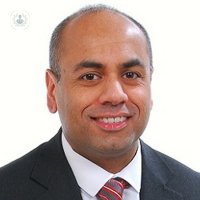8 weight loss myths
Written in association with:The many myths and misconceptions surrounding weight loss can lead to frustration, as well as unrealistic expectations.
Here, Professor Franklin Joseph, renowned consultant physician in endocrinology, busts some of the most common myths about weight loss.

Myth 1: You need to eat less of everything to lose weight.
Fact: While reducing overall calorie intake is important for weight loss, it's not just about cutting back on everything. Focus on filling your plate with nutritious, low-calorie foods like fruits, vegetables, and whole grains. These foods keep you feeling fuller for longer and provide essential nutrients.
Myth 2: Skipping meals helps you lose weight faster.
Fact: Skipping meals can actually trigger your body to hold onto existing fat stores and slow down your metabolism. This makes it harder to lose weight in the long run. Aim for regular, balanced meals and snacks throughout the day to keep your metabolism going and prevent overeating later.
Myth 3: All calories are created equal.
Fact: While calorie counting can be helpful, the type of calories you consume matters. Empty calories from processed foods and sugary drinks provide little to no nutritional value and contribute to weight gain. Prioritise nutrient-rich foods that keep you feeling full and support overall health.
Myth 4: Exercise is only for burning calories.
Fact: Exercise plays a crucial role in weight loss by boosting metabolism and building muscle. However, its benefits extend beyond calorie burning. Regular physical activity improves mood, reduces stress, and strengthens your heart and bones, leading to a healthier overall lifestyle.
Myth 5: You can target specific areas for fat loss.
Fact: Unfortunately, spot reduction (losing fat in only one area) isn’t possible. Your body stores fat throughout your body, and where you lose it first is primarily determined by genetics. Focus instead on overall body fat loss through a healthy diet and exercise routine.
Myth 6: Eating late at night makes you gain weight.
Fact: What matters most is your total calorie intake throughout the day, not specifically when you eat them. However, eating late at night might disrupt your sleep and contribute to unhealthy snacking later, so it's generally recommended to have dinner at least 2-3 hours before bedtime.
Myth 7: Supplements are a magic bullet for weight loss.
Fact: Supplements alone aren’t an effective way to lose weight. While some might offer slight metabolic boosts, they aren’t a substitute for a healthy diet and exercise. Consult with a healthcare professional before taking any supplements for weight loss.
Myth 8: Weight loss is linear and easy.
Fact: Weight loss is often a gradual and nonlinear process. There will be ups and downs, plateaus, and setbacks. The key is to be patient, stay consistent with your habits, and celebrate your non-scale victories along the way.
It’s important to remember that the best approach to weight loss is a sustainable and holistic one. Focus on making healthy changes to your diet and exercise routine, prioritise your overall well-being, and consult with healthcare professionals. Don't fall prey to myths and quick fixes, and embrace a journey towards a healthier you!
To schedule an appointment with Professor Franklin Joseph, head on over to his Top Doctors profile today.


